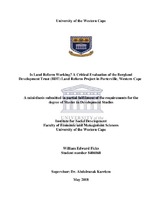Is land reform working? A critical evaluation of the Bergland Development Trust (BDT) land reform project in Porterville, Western Cape
Abstract
Land reform is currently high on the agenda of the current government. This is because many
people believe that land reform is a valuable tool in addressing the land question and combating
poverty in South Africa. It is also evident that government and experts on land reform are clear
that in order to enhance land reform in the country, the land must be used to improve the
livelihoods of those who need it the most. It is also pivotal that land reform is successful in
order to ensure food security. It is important to evaluate these types of land reform models in
order to gain valuable insights and lessons that can enhance successful land reform projects in
the country that can also serve as a manual for farmers and governments.
Although much research focuses on the failure of land reform projects, this research focuses on a
successful land redistribution programme that improved the livelihoods of rural people. More
specifically, this research critically evaluated the Bergland Development Trust (BDT) land
reform project in the Porterville region in the Western Cape province of South Africa. The BDT
land reform project is a joint venture between the workers of the Berghoff Farm and their
employer, the farmer who also served as a valuable mentor to them. My research found that BDT
land reform project improved the livelihoods of the beneficiaries of the project. The BDT
beneficiaries earn a sustainable income which, in turn, helps them to buy clothes, vehicles, and
enrol their children at the local former ‘Model C’ school. Furthermore, active participation in the
project has enhanced the self-image and bargaining power of the beneficiaries which, in turn,
extended their livelihoods base.
This study is guided by the sustainable livelihoods approach to development. This study
critically analysed the factors contributing to their successes and also explored the lessons it
holds for other land reform projects. A qualitative research design was employed in order to
obtain the necessary data for the research. The data was collected by means of semi-structured
interviews and questionnaires with the management of the Bergland Development Trust land
reform project. After a critical assessment of the BDT land reform project, the recommendations
will be forwarded to the Local Government and other projects that will benefit from the
experiences of the BDT land reform project.

